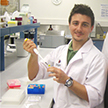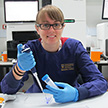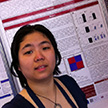Question: Is it possible that one bacteria or whatever you call it in cancer is in common with every cancer? If so... Do all the other things that make cancer cancer rely on it? Why don't we just find a way to kill that on bacteria and give every one that vaccine?
Keywords: bacteria, cancercure









Bacteria don’t cause cancer. Some studies have suggested that repeated gut infections may lead to an increased risk of certain gut cancers though. Unfortunately, we still don’t know exactly what causes normal cells to become cancerous. There is one exception, and that is cervical cancer. Most cervical cancers are known to develop because of exposure to certain strains of the human papilloma virus. A very smart Australian scientist, called Ian Frazer worked this out, and created gardasil, the vaccination against some of the most common HPV strains that cause cervical cancer.
Because every type of cancer produces very different proteins, it is very hard to create a drug or vaccine which can target every cancer. However, scientists all around the world are working very hard to discover what cancers cells do make which is different from normal cells so we can test for this as a diagnostic test, or to create drugs against it. Breast cancer research has lead to the discovery of specific genes which result in a very big chance of getting breast cancer, and also some excellent drugs such as herceptin.
The biggest problem is that many of the things which cancer cells produce which could be used to test for them, or to make a drug against them, are also made by normal cells, which makes them useless as a test or drug target. new technology has recently been developed over the last few years which makes it much easier to screen normal and cancerous cells and to tell which genes or proteins are only made by cancer cells. I hope that this means we will have several big discoveries in the field of cancer research in the next 5-10 years.
0
Hi Hiren, cancer is primarily caused by mutations to the DNA within cells. Your DNA has all the necessary instructions that controls cell growth and cell division. It is not uncommon for healthy cells to develop mutations in their DNA, but they have the ability to repair most of these mutations. Or, if they can’t make the repairs, the cells kill themselves. However, certain mutations cannot be repaired, causing the cells to grow and become cancerous. Because these mutations are not uniform across all cell types we can’t develop one-size-fits-all treatment for cancer.
0